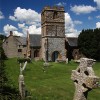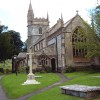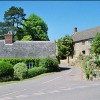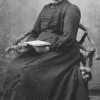Bridport was on a war footing, and a total of 800 evacuees were billeted in the town, local villages receiving another 600. Most were children but the youngest had mothers to look after them. The senior pupils of the grammar school met a party of infants. Air raid precautions were in full swing and the town was blacked out. Seven couples rushed to the registrar to apply for special marriage licences. You could be fined for showing a light at night. Who knew what the war had in store?
William ‘Gordon’ Parsons was just one of the khaki-clad soldiers stationed in Bridport during the Second World War. Most never went back there, but Gordon did, in fact he fell in love with the south Dorset town and its West Bay seascape – and he has vivid recollections of the two months he spent in the town in 1942 – on duty for his country and the free world.
He tells of a ‘recce’ he made to West Bay with his Pal Jim Ripley (later killed in Sur Andre sur Ome.) As they walked along they passed women making fishnets on the pavements. Then, smelling the sea, they struck out across the fields – and met two Yeovil girls coming from the beach, with whom they had a drink at the Bridport Arms. This inn became Gordon’s lodgings, although he was actually posted not to the Bridport Arms but to the Bridport Armouries!
One memory is that of being one of a party which moved the belongings of the wife of Gordon’s Officer Commanding, Major Jack Kindersley, to a mansion in the neighbourhood of Piddlehinton, another the large melees of soldiers in the centre of Bridport after an evening ‘pubbing’ in the town. A radio officer, Gordon drove the platoon officer around in a jeep.
He made a lifelong friend of John Powell of Melpash, who he got in touch with again through the Legion magazine. Before leaving the town as a soldier, he was given a 21st birthday party at the Bridport Arms, and later went back there on leave. He met local fishermen Harry Hawks and his brother who used to bring steaming bowls of winkles into the lower bar at the Bridport Arms, telling of their rejuvenating powers.
During one of his leaves at Bridport Gordon went out in a rowing boat with Harry to salvage some bales of raw rubber, which had floated away from a torpedoed freighter, beaching them on the West Cliff, from where they were washed back out to sea in a gale, and some were stolen. ‘Hawks’ may have been a nickname, as Gordon knows of no one by that name at West Bay although Hawkins is a local name.
During the preparations for the landings at Dieppe, the famous movies star Lieut. Commander Douglas Fairbanks came ashore from one of the American ships in the flotilla. “There was much giggling, oohing and ahhing.” When some residents got back to their rooms… they were surprised to find exhausted Canadian soldiers in full battle gear asleep on their beds.
The Dieppe Force, which consisted mainly of Canadians, trained in and off the Isle of Wight. A force of 5,000 Canadian, 1,057 British, about 50 American rangers and a handful of Free French took part in the raid, but some of the landing craft missed the target beach, German armed trawlers attacked one of the gunboats, landing craft had to scatter for safety. Twenty-seven light tanks were landed but were destroyed, together with many of the attacking servicemen, who were pinned down on the narrow beach by an accurate and murderous fire.
Heavy loss of life took place. It was one of the war’s worst disasters. Gordon and his buddies returned to enjoy the friendly atmosphere of West Bay and Bridport, where several roofs, including those of the Bridport Arms and the Methodist Church, were set on fire by smoke shells fired during practices. Landmines were laid on the beach.
One night, looking out of west-facing windows at the Arms, “I was witness to the exciting sight of tracers bouncing off the cobblestones in my direction, some slamming into the building as two planes roared overhead…I watched the exchange of tracers until they faded out far to the southwest over the Channel.”
The town was to be honoured when Very Important people called there. The special visitors were none other than King George VI and his aides, who took tea at the Bull. This was supposed to be top secret, but a huge crowd watched the King leave the inn with his aides. Meanwhile, the Home Guard practised at a rifle range at Colmers Hill near Symondsbury.
War Weapon Week raised no less than £200,000 in 1940. This went towards the construction of HMS Bridport, a coastal patrol vessel. Through National Savings – one person in every three in Dorset belonged to a savings group – the target figure was reached in January 1943.
Now, one day, a ship bought with Dorset’s money will sail the seas, proud in a glorious tradition. This is a people’s war, and it will be a people’s ship!” enthused the ‘Bridport News.’ The vessel was later taken over for air-sea rescue operations. The ship’s bell was eventually placed in the Town Hall.
Early in the war, senior girls at the grammar school knitted items for the Army and a bomb did considerable damage near the Lord Nelson pub. Later, the Women’s Institute and Scouts collected a mountain of gifts for London and southeast England, which had been shattered by V-bomb attacks.
Bridport was the home of the country’s ‘Ideal NAAFI Girl.’ The NAAFI’s provided meals for the troops. Miss Eileen Bishop (21), formerly an assistant in a draper’s shop, competed with 25,000 others for the title, and when she alighted from the train at Bridport station after interviews and stage and radio appearances, she got a rousing reception.
Elsie and Doris Waters, the popular broadcasters, appeared in ‘Gert and Daisy’s Weekend’ which topped the bill at the Bridport Palace. Others who trod the boards there at this time were Charles Bickford, Barton MacLane, Harry Langdon and Betty Blythe. Among film actors seen were Gordon Harker and Sydney Howard.Farmers were informed that if they wished land to lie fallow for more than a year they had to receive permission, otherwise the land would be forcibly ploughed up. In pursuance of the food production programme pigeon shoots were arranged throughout the county.
An increase in Home Guard numbers was being called for. The Home Guard in Dorset was being described as a “formidable military instrument,” although weakened by men joining the regular forces, and an appeal was issued for every man who could to come forward.
The ‘Bridport News’ reported on January 1, 1943: “A huge tidal wave, towering 80 feet high, smashed through the famous Chesil Bank… and swept a mile inland, causing tremendous damage to homes and property.” For more than a week no trains could run between Portland and Weymouth because the lines were under water. The receding floods left enormous boulders in the gardens of homes far inland.
People indoors were knocked over as the water rushed through doors and windows. Nothing like this inundation, the paper reported, had been seen in Portland since 1824, when the seas swept over the beach and drowned 25 people.
And 10 days after this giant wave had hit the coast to the east; the sea wall was breached for 40 feet at West Way during a great gale of wind.
Peace, when it came, was celebrated in grand style, with bunting, bells and street parties. There were still 230 evacuees in the town at the end of the war, and a few families liked the town so much they made Bridport their permanent home.



